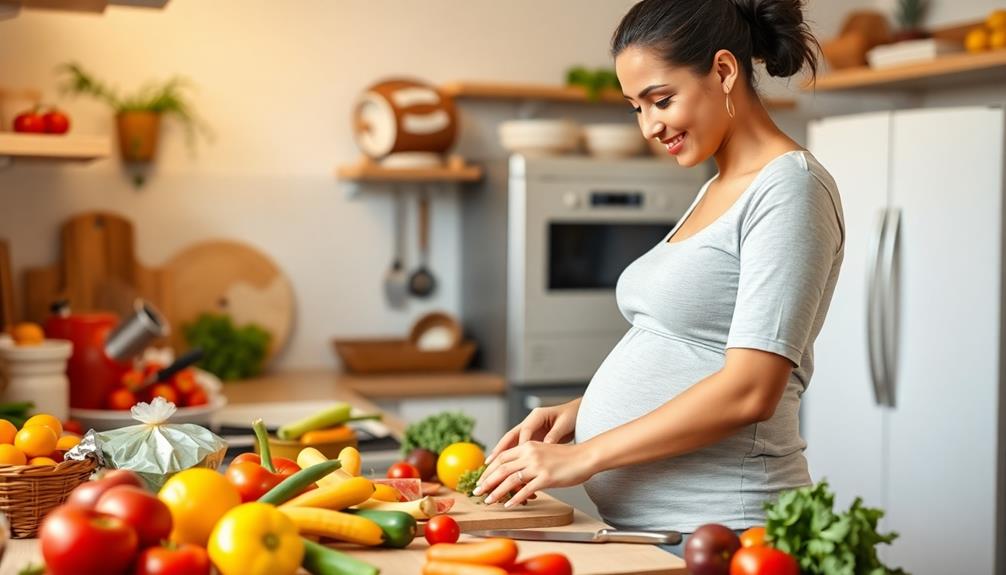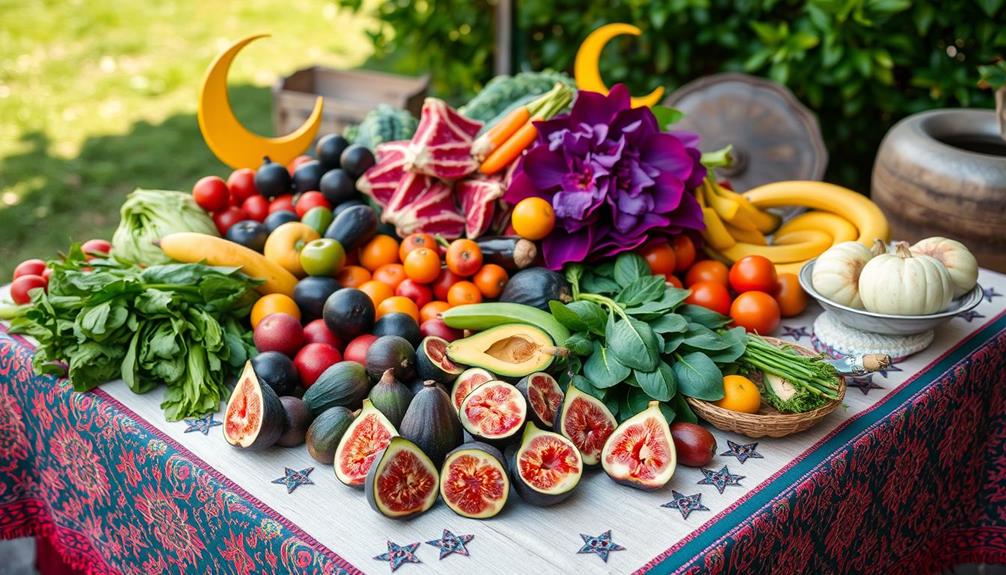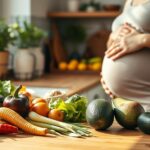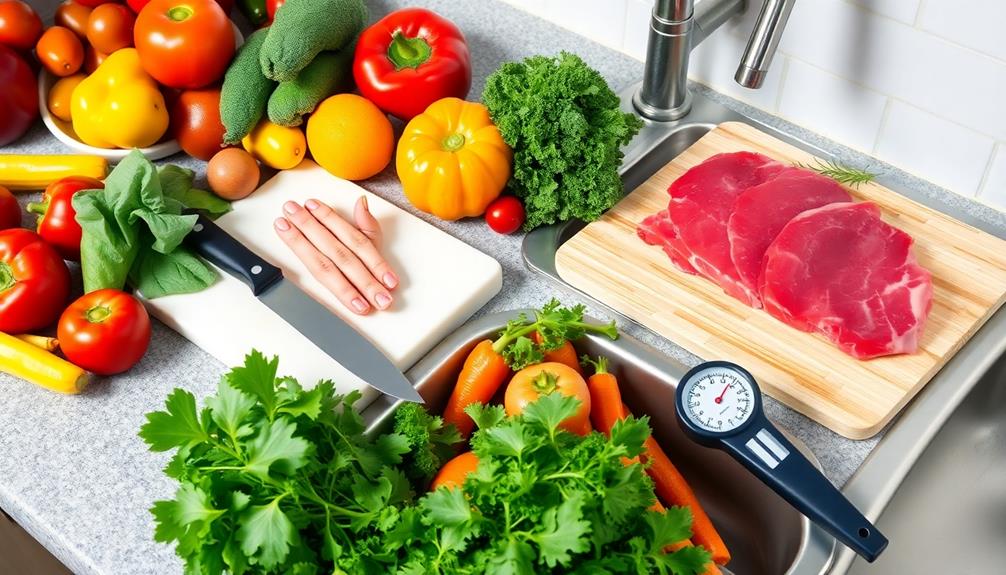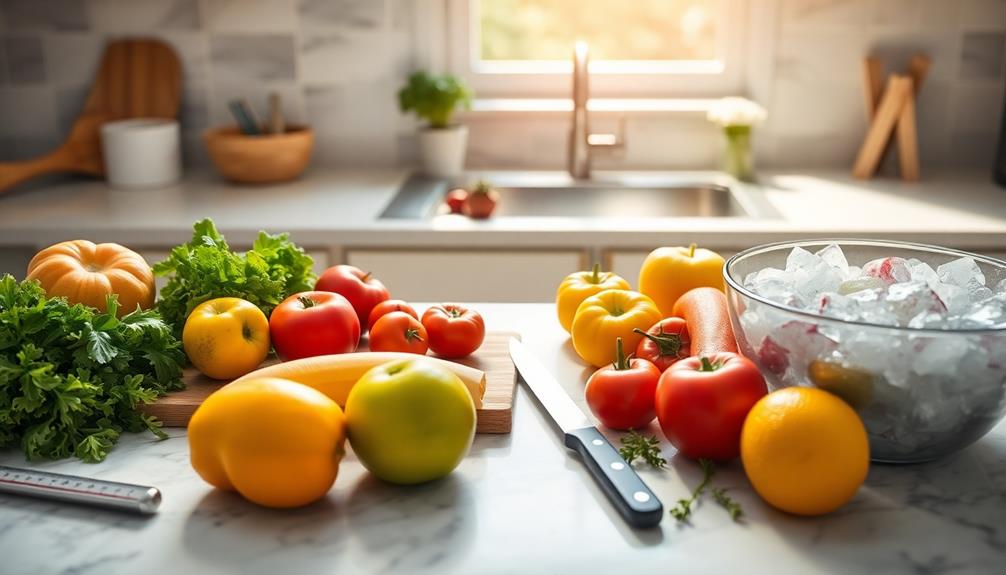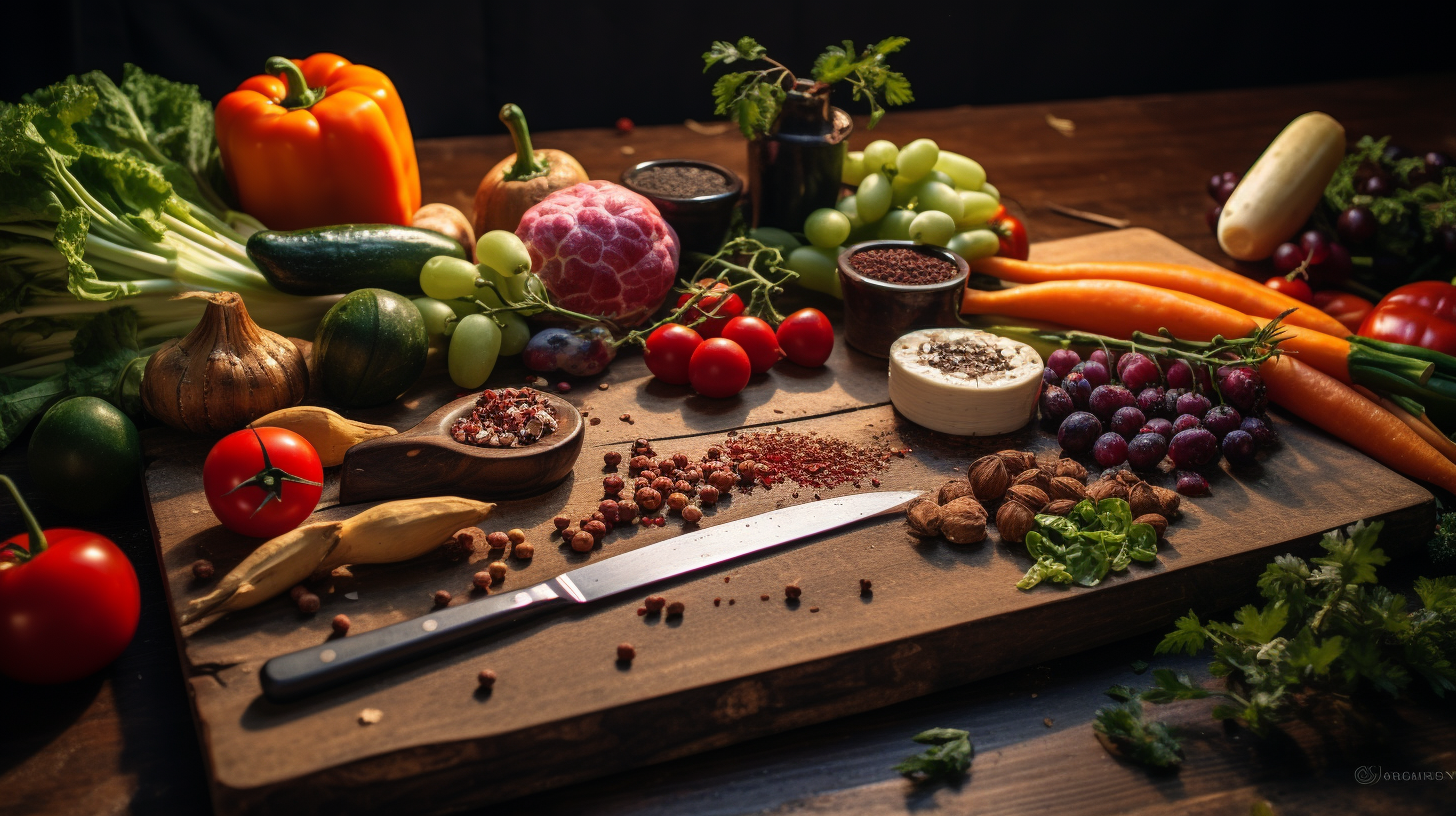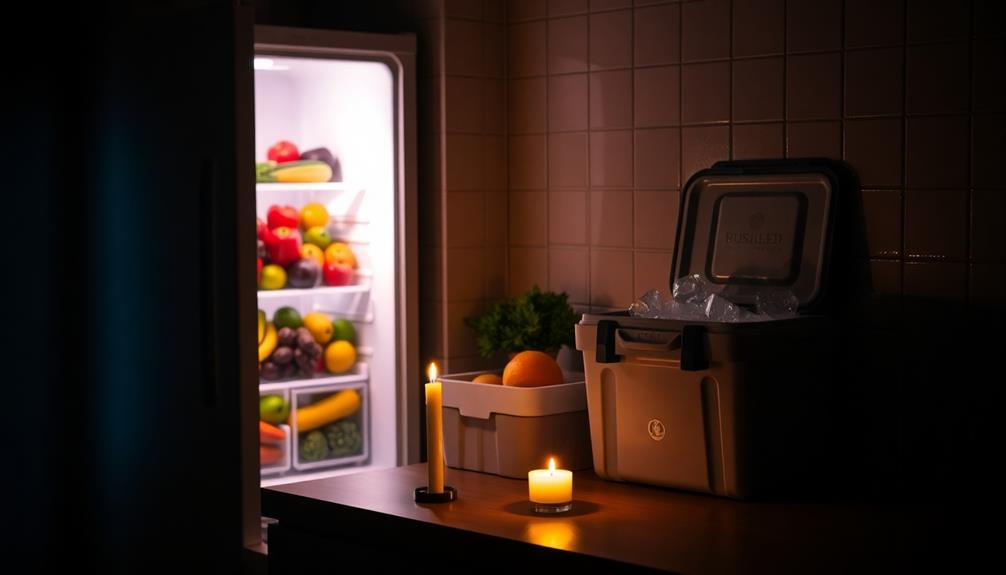Raw food safety during pregnancy is crucial for your and your baby's health. Consuming raw fish, sushi, and undercooked meats can expose you to harmful pathogens like Listeria, salmonella, and E. coli, leading to serious complications. It's important to cook meats to safe temperatures and avoid unpasteurized dairy products. Be cautious with soft cheeses, deli meats, and raw sprouts, which can also harbor dangerous bacteria. Always wash fruits and vegetables thoroughly. Consulting your healthcare provider about dietary choices can help guarantee you're making safe decisions. There's a lot more to understand about safe eating practices during this critical time.
Key Takeaways
- Pregnant women should avoid raw fish, shellfish, and undercooked meats to reduce the risk of foodborne illnesses like listeriosis and salmonella.
- Always cook meats to safe internal temperatures: 145°F for whole cuts, 160°F for ground meats, and 165°F for poultry.
- Consult healthcare providers before consuming raw or semi-cooked foods, especially during pregnancy's first trimester.
- Wash hands, utensils, and surfaces thoroughly to prevent cross-contamination, and use separate cutting boards for raw meats and ready-to-eat foods.
- Opt for pasteurized dairy products and thoroughly wash fruits and vegetables to minimize contamination risks during pregnancy.
Risks of Raw Foods
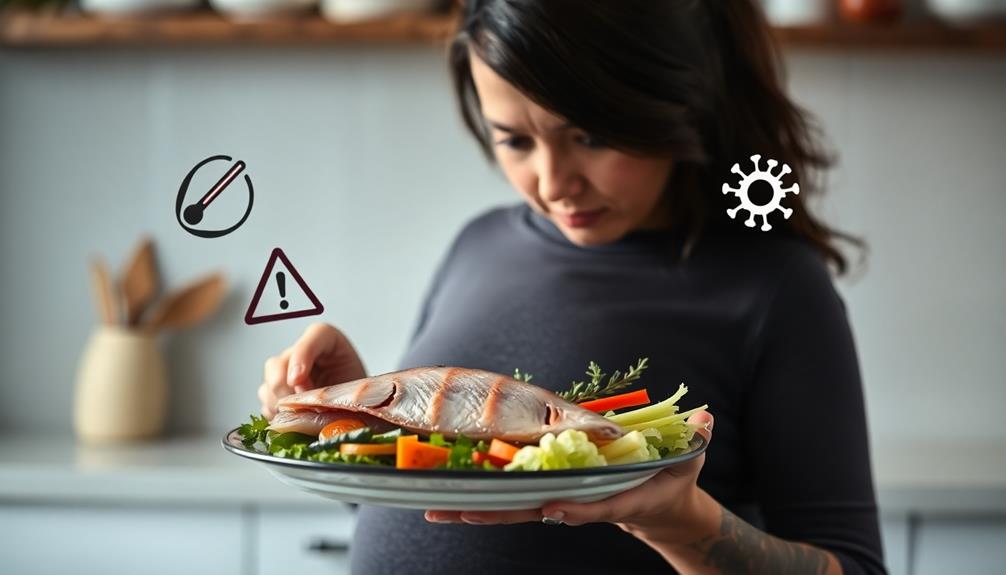
When it comes to pregnancy, what risks do raw foods pose? For pregnant women, consuming raw foods like sushi, sashimi, and shellfish can greatly increase the risk of food poisoning. This is particularly concerning during the first trimester when the developing fetal immune system is highly vulnerable to infections.
Raw foods can harbor dangerous pathogens such as Listeria, which can lead to listeriosis—an infection that can cause miscarriage or severe complications for newborns.
Pregnancy also alters your gut microbiome, making you more susceptible to foodborne illnesses. Food poisoning can lead to dehydration and, in some cases, hospitalization.
It's not just seafood you need to watch out for; raw eggs and undercooked meats can expose you to harmful bacteria like salmonella and E. coli. These infections can adversely affect your pregnancy outcomes and overall health.
Ultimately, the risks associated with raw foods during pregnancy are considerable. To protect both yourself and your baby, it's best to avoid these foods entirely and opt for safe, fully cooked alternatives. Your health and your baby's well-being should always come first.
Common Foodborne Illnesses
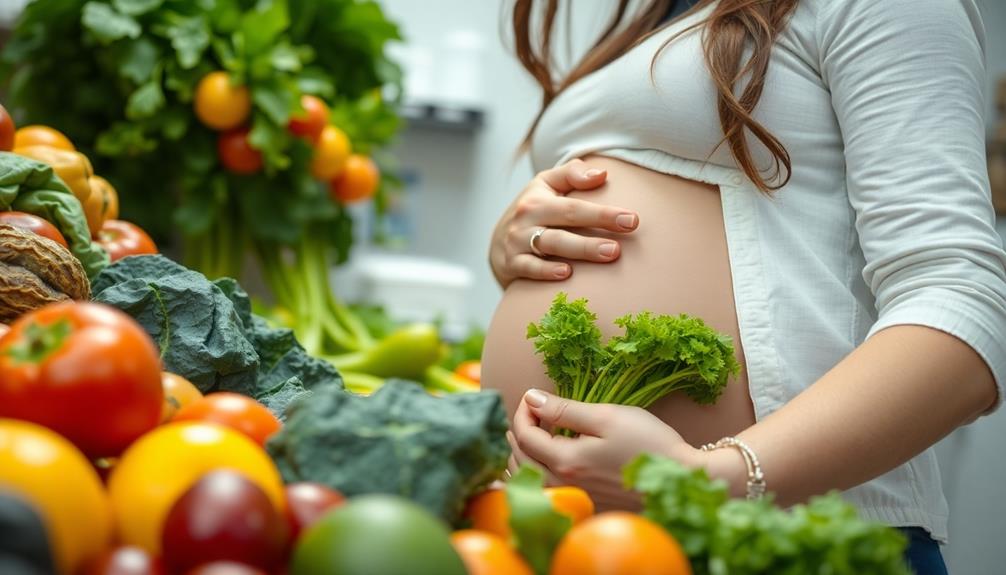
Food safety is an essential concern during pregnancy, as certain foodborne illnesses can pose significant risks to both you and your developing baby. Being aware of these common foodborne illnesses is important to guarantee your health and protect your little one.
- Listeriosis: Often caused by deli meats and unpasteurized dairy, listeriosis can lead to serious complications, including miscarriage or stillbirth.
- Salmonella: Typically found in undercooked poultry, eggs, and certain fish, salmonella may cause gastrointestinal symptoms like diarrhea and abdominal pain. While it poses a lower risk to your unborn baby than listeriosis, it's still important to avoid.
- Toxoplasmosis: Primarily transmitted through raw or undercooked meat and unwashed produce, toxoplasmosis can lead to severe health issues for your baby, including neurological problems and vision loss.
The Centers for Disease Control and Prevention (CDC) notes that pregnant women are about 10 times more likely to be hospitalized from foodborne illnesses than the general public.
If you experience symptoms like fever, vomiting, or diarrhea, seek immediate medical attention.
Prioritizing food safety during pregnancy is fundamental for your well-being and that of your baby.
Essential Food Safety Tips
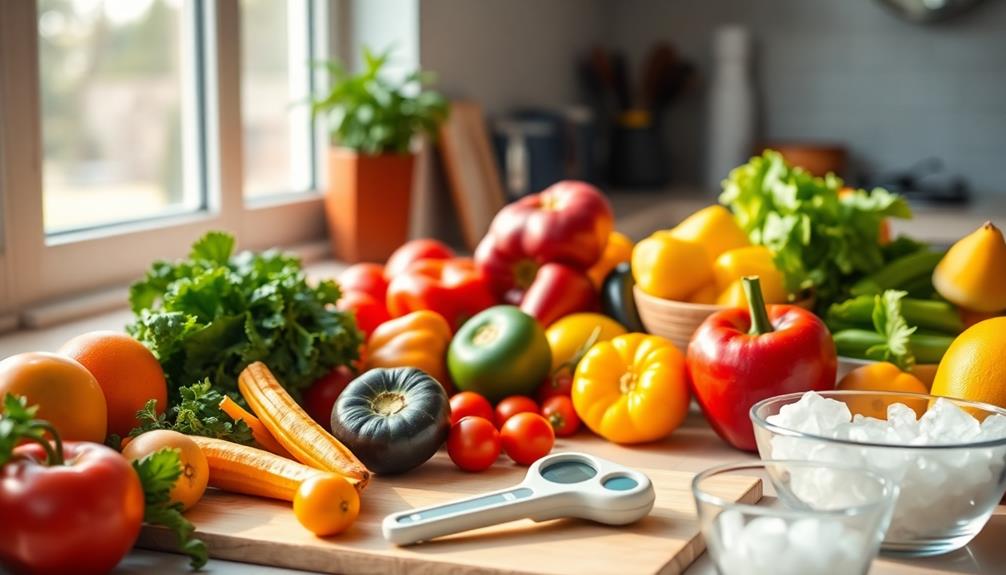
Your health and your baby's safety depend on practicing essential food safety tips during pregnancy. Start by washing your hands, utensils, and surfaces thoroughly with soap and water before and after handling food. This prevents cross-contamination and reduces the risk of harmful bacteria.
Always use separate cutting boards for raw meats and ready-to-eat foods to further minimize the chance of foodborne illness.
Make certain to cook all meats to the proper internal temperatures: 145°F for whole cuts, 160°F for ground meats, and 165°F for poultry. These temperatures effectively eliminate harmful bacteria that could lead to food poisoning.
When reheating leftovers, ensure they reach a safe temperature of 165°F and consume them within three to four days of cooking.
Opt for pasteurized dairy products, as they're safe to eat during pregnancy. Additionally, always wash fruits and vegetables thoroughly to reduce the risk of bacterial contamination.
Following these essential food safety tips will help you enjoy a healthier pregnancy while keeping both you and your baby safe from foodborne illnesses.
Foods to Avoid
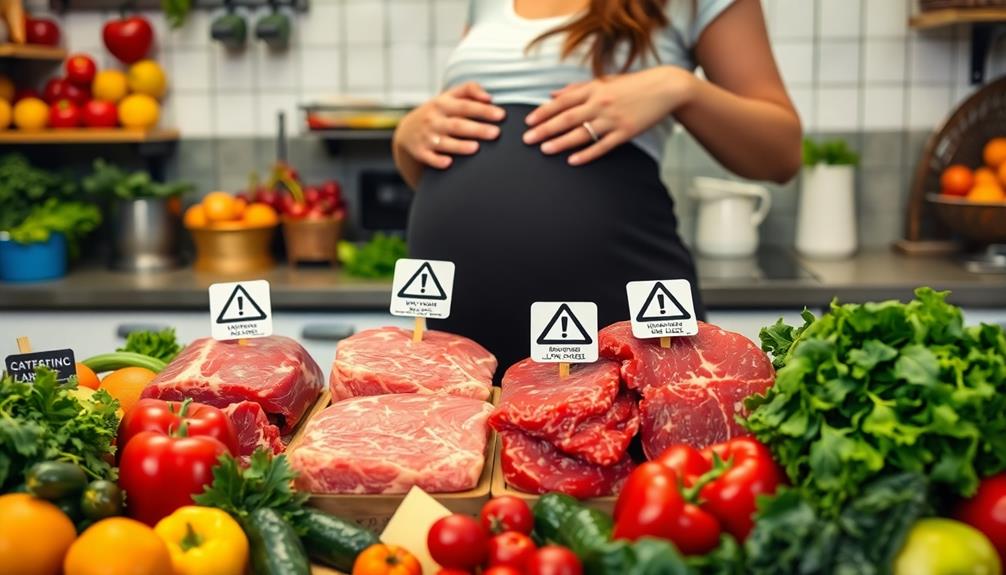
Safety during pregnancy is paramount, and avoiding certain foods is essential to protect both you and your baby. Here are some foods you should steer clear of during this vital time:
- Raw fish and shellfish, including sushi, can harbor harmful bacteria and viruses that pose serious health risks.
- Soft cheeses, particularly unpasteurized varieties like Brie and Queso Fresco, may contain listeria, which can lead to severe complications.
- Deli meats should be avoided unless heated to steaming hot, as they can also carry listeria.
Additionally, make sure to avoid fish with high levels of mercury, such as shark, swordfish, king mackerel, and tilefish. These fish can negatively affect your baby's brain development.
You should also steer clear of raw sprouts, like alfalfa and mung beans, since they can carry bacteria that can harm both you and your baby.
Safe Cooking Temperatures
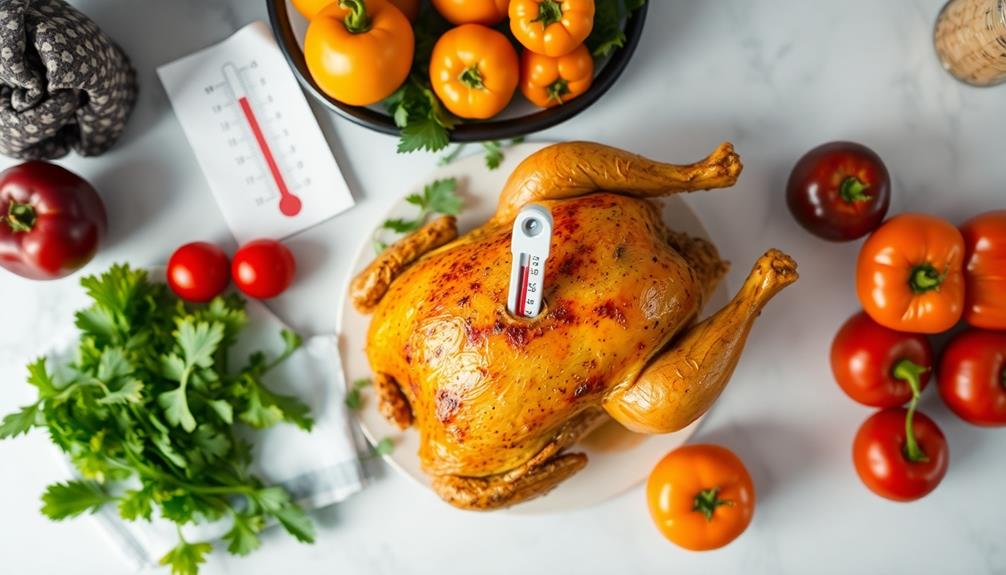
When you're cooking during pregnancy, it's essential to know the safe temperatures for different foods.
For instance, whole cuts of meat should reach 145°F, while poultry needs to hit 165°F to guarantee safety.
Keeping these temperatures in mind can help you protect both your health and your baby's.
Recommended Cooking Temperatures
Cooking food to the right temperatures is essential, especially during pregnancy. Properly cooked meals help eliminate harmful bacteria, reducing your risk of foodborne illnesses like salmonella.
Here are some key internal temperatures to keep in mind:
- Whole Cuts of Meat: Cook beef, pork, lamb, and veal to at least 145°F (63°C) and let it rest for three minutes before serving.
- Ground Meats: Make sure ground meats, such as beef and pork, reach an internal temperature of 160°F (71°C) to kill any potential bacteria.
- Poultry: Always cook chicken and turkey to a minimum of 165°F (74°C) to prevent salmonella infections.
Additionally, cook eggs until both the yolk and white are firm, avoiding any raw or lightly cooked preparations.
When it comes to leftovers and casseroles, reheat them to an internal temperature of 165°F (74°C) for safe consumption.
Safe Food Handling Tips
To keep your food safe during pregnancy, it's vital to follow proper food handling practices. Adhering to safe food handling tips can greatly reduce the risk of food poisoning, which can harm both you and your baby.
Start by cooking whole cuts of raw meat to an internal temperature of at least 145°F (63°C) and ground meats to 160°F (71°C). For poultry, aim for 165°F (74°C) to eliminate harmful pathogens like salmonella.
When it comes to cooked seafood, make sure it reaches a minimum internal temperature of 145°F (63°C). Remember, shrimp and lobster should be opaque and firm when fully cooked.
Using a food thermometer is imperative. Always verify that leftovers are reheated to at least 165°F (74°C) before you dig in.
Additionally, keep hot foods at or above 140°F (60°C) and cold foods at or below 40°F (4°C) to minimize risks during storage and serving.
If you have any questions about food safety, don't hesitate to reach out to your local health department for guidance. Following these practices will help create a safer environment for you and your little one.
Guidelines for Eating Raw Foods
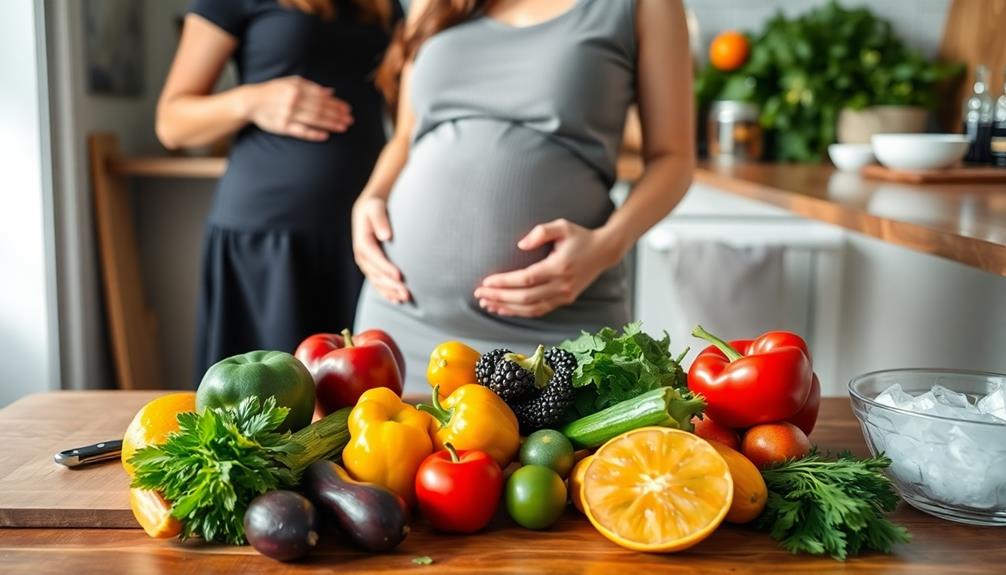
When it comes to eating raw foods during pregnancy, you need to make informed choices, especially after the first trimester.
Always consult with your healthcare provider before adding any raw or semi-cooked foods to your diet, as they can help assess your individual risks.
Keep in mind that consuming raw foods can pose significant health risks for both you and your baby.
Safe Choices After Trimester
Many pregnant women can safely enjoy raw foods after the first trimester, but it's crucial to approach this with caution. As your baby's immune system develops, the risks associated with consuming raw foods decrease considerably.
However, you should always prioritize food safety and your personal health conditions when making choices.
Here are some tips for enjoying raw foods safely:
- Choose reputable establishments: Always source raw or semi-cooked foods from places that adhere to high food safety standards.
- Stay informed about your health: Monitor any symptoms related to foodborne illnesses and consult with your healthcare provider before reintroducing raw foods into your diet.
- Consider semi-cooked options: Foods like soft-boiled eggs and medium-rare steaks can also be safe during pregnancy, provided they're prepared according to strict guidelines.
Medical Consultation Importance
Consulting your healthcare provider before consuming raw or undercooked foods is necessary during pregnancy. Medical consultation is important for evaluating your individual health risks and dietary needs.
As you navigate your pregnancy, especially after the first trimester, getting approval from your healthcare provider can greatly enhance the safety of your food choices for both you and your baby.
Healthcare professionals can offer personalized guidance on handling raw foods safely, which helps reduce the risk of foodborne illnesses. They'll discuss your personal health history, any allergies, and how these factors may affect your ability to safely consume raw items.
This dialogue is essential for identifying any potential risks associated with your diet during pregnancy. Regular consultations with your healthcare provider also play a necessary role in monitoring any symptoms related to foodborne illnesses.
If you do experience any issues, timely intervention can be decisive. Remember, prioritizing safety through professional guidance will help guarantee you make informed choices about including raw foods in your pregnancy diet.
Don't hesitate to reach out to your healthcare provider for clarity and support.
Risks of Raw Consumption
Pregnant women face significant risks when consuming raw foods due to harmful bacteria and parasites that can lead to serious infections. These risks are particularly heightened during the first trimester, when your baby's immune system is still developing.
By choosing raw or undercooked items, you increase your chances of encountering listeria, salmonella, and other pathogens that can cause food poisoning.
Here are some key risks associated with raw consumption during pregnancy:
- Raw seafood: Items like sushi and shellfish can harbor Vibrio vulnificus, leading to gastroenteritis and severe health complications.
- Undercooked eggs: These can contain salmonella, which poses a risk of food poisoning and may result in dehydration and hospitalization.
- Listeria: Often found in raw deli meats and unpasteurized cheeses, this bacterium can cause severe complications for your unborn child.
It's vital to consult your healthcare provider before consuming any raw or semi-cooked foods, even after the first trimester, to guarantee your safety and that of your baby.
Prioritizing food safety is essential for a healthy pregnancy.
Importance of Food Safety Education
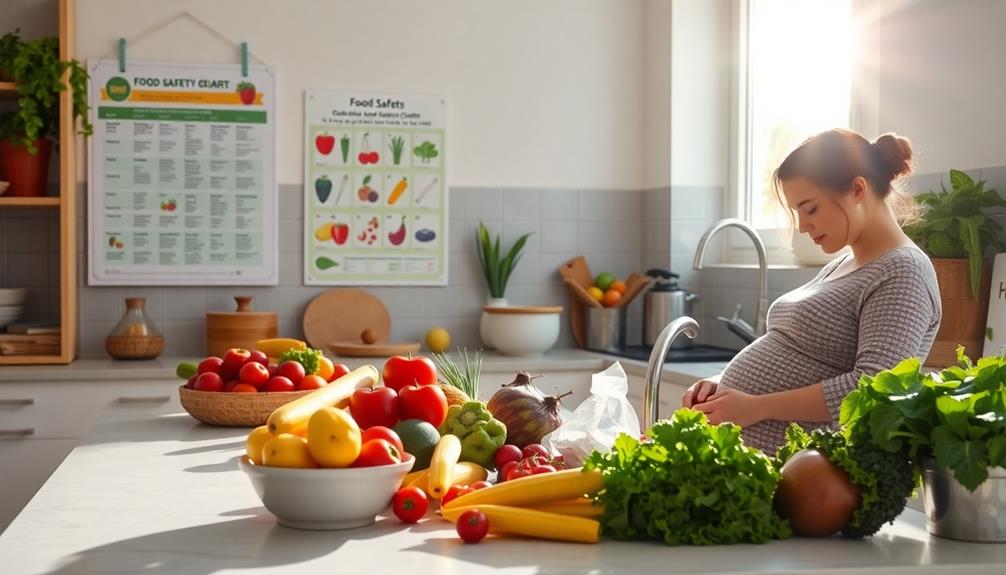
Understanding food safety education is essential for expectant mothers managing the complexities of nutrition during pregnancy. By grasping the risks associated with raw foods, you can protect both yourself and your baby from serious infections like listeriosis and salmonellosis. Recognizing the symptoms of foodborne illnesses allows you to seek timely medical attention if needed.
Here's a quick reference on food safety practices:
| Safe Practices | Importance |
|---|---|
| Wash hands and utensils | Reduces contamination risk |
| Use separate cutting boards | Prevents cross-contamination |
| Properly cook foods | Kills harmful bacteria |
| Stay updated on guidelines | Guarantees safe eating habits |
Public health campaigns play an important role in educating expectant mothers about the dangers of raw and undercooked foods. By maintaining awareness of safe food handling practices, you can greatly lower the risk of foodborne illnesses during your pregnancy. Continuous monitoring of food safety standards guarantees that you have access to the latest recommendations for safe eating practices. Prioritizing food safety education is a critical step toward a healthier pregnancy.
Prenatal Nutrition Considerations
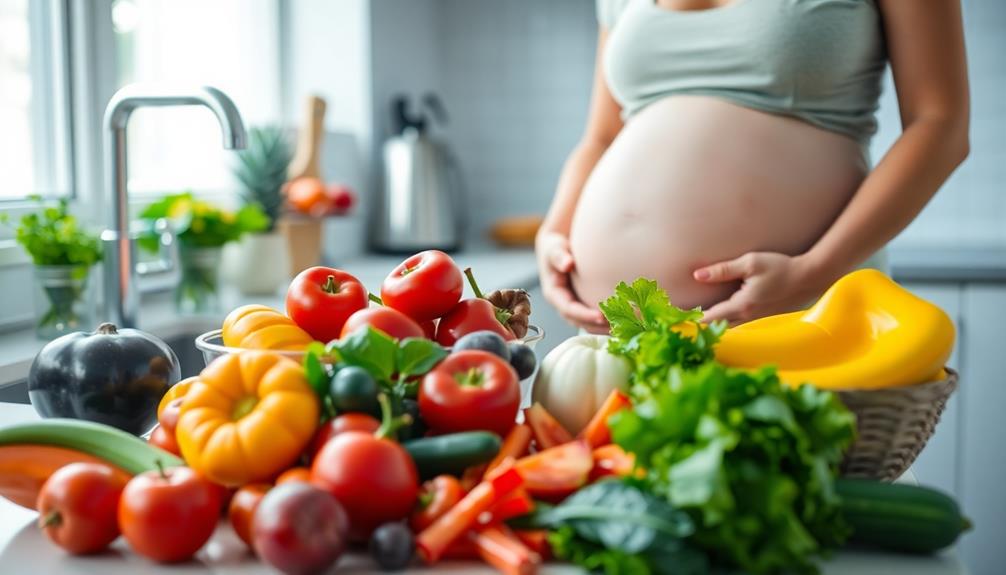
Food safety education lays the groundwork for making informed dietary choices during pregnancy. A balanced diet rich in fruits, vegetables, whole grains, and lean proteins is necessary for both you and your baby's health.
It's essential to eat nutrient-dense foods and consider specific guidelines to support a healthy pregnancy.
Here are some key prenatal nutrition considerations:
- Aim for 8-12 ounces of low-mercury fish, like shrimp, salmon, and catfish, each week for omega-3 fatty acids.
- Limit caffeine to less than 200 mg per day to reduce the risk of miscarriage and low birth weight.
- Incorporate fortified cereals and leafy greens to guarantee you get enough folic acid, crucial for preventing neural tube defects.
While it's important to include fish in your diet, you should avoid raw or undercooked seafood during pregnancy to minimize foodborne illness risks.
Prenatal vitamins containing folic acid, iron, and calcium can help fill nutritional gaps and meet the increased demands of pregnancy.
Healthy Eating Practices
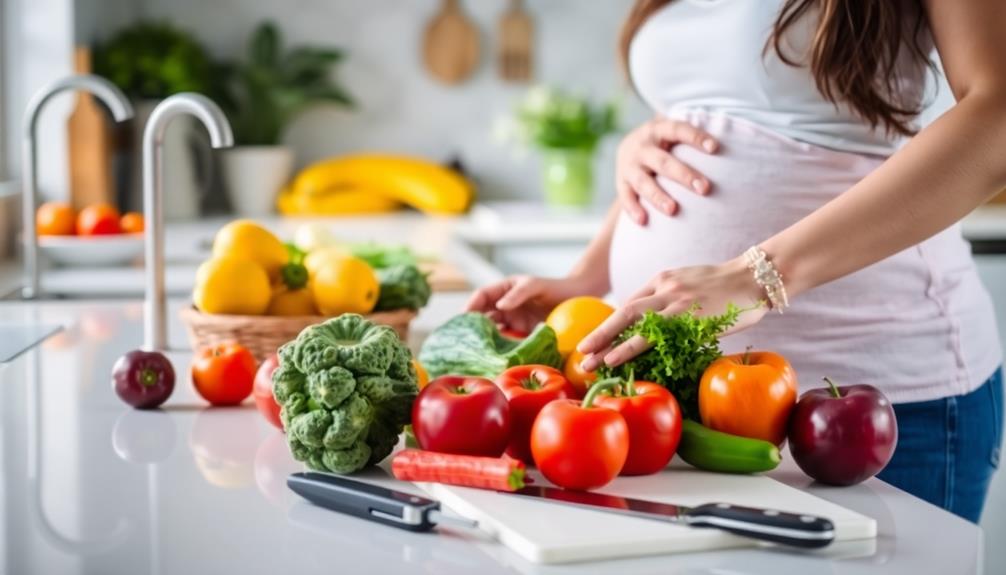
Maintaining a healthy diet during pregnancy is essential for both you and your baby's well-being. Prioritize a balanced intake of fruits, vegetables, whole grains, and lean proteins to support maternal and fetal health.
When consuming raw foods, always wash them thoroughly to eliminate harmful bacteria like E. coli and toxoplasmosis. Incorporating pasteurized dairy products into your diet is important; unpasteurized options can pose serious risks, including listeriosis, which might harm your unborn baby.
It's also important to limit your caffeine intake to less than 200 mg per day—about 1.5 cups of coffee—to reduce the risks of low birth weight and miscarriage.
When it comes to fish, include safe options that are low in mercury, such as salmon and shrimp. Consulting with your healthcare provider about dietary choices, especially concerning safe fish consumption and potential food allergies, is key to maintaining healthy eating practices during your pregnancy.
Frequently Asked Questions
Is It Safe to Eat Raw Food While Pregnant?
Eating raw food while pregnant isn't considered safe. You increase your risk of foodborne illnesses, which can harm both you and your baby. It's best to consult your healthcare provider for personalized dietary advice.
Can I Have One Piece of Raw Sushi While Pregnant?
You might wonder if you can have one piece of raw sushi while pregnant. It's best to avoid it, as even a small amount can pose risks to you and your baby's health. Always consult your healthcare provider.
Is It Unsafe to Eat Unpasteurized Foods During Pregnancy?
Is it really worth the risk? You should avoid unpasteurized foods during pregnancy. They can harbor harmful bacteria, increasing the chance of serious illnesses for both you and your baby. Choose pasteurized options instead.
Can I Handle Raw Chicken While Pregnant?
You can handle raw chicken, but you must practice strict hygiene. Always wash your hands and surfaces afterward, and guarantee it's cooked thoroughly to avoid harmful bacteria that could pose health risks. Stay safe!
Conclusion
When it comes to raw food safety during pregnancy, it's essential to play it safe. You want to guarantee you're protecting both your health and your baby's. By being aware of the risks, following food safety tips, and avoiding certain foods, you can steer clear of potential hazards. Remember, an ounce of prevention is worth a pound of cure. Prioritize your nutrition with safe practices, and you'll set the stage for a healthy pregnancy and a thriving baby.

